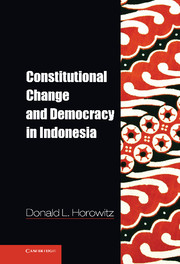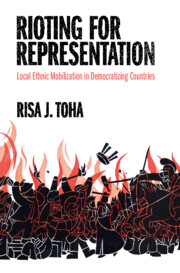Constitutional Change and Democracy in Indonesia
How did democracy became entrenched in the world's largest Muslim-majority country? After the fall of its authoritarian regime in 1998, Indonesia pursued an unusual course of democratization. It was insider-dominated and gradualist and it involved free elections before a lengthy process of constitutional reform. At the end of the process, Indonesia's amended constitution was essentially a new and thoroughly democratic document. By proceeding as they did, the Indonesians averted the conflict that would have arisen between adherents of the old constitution and proponents of radical, immediate reform. Donald L. Horowitz documents the decisions that gave rise to this distinctive constitutional process. He then traces the effects of the new institutions on Indonesian politics and discusses their shortcomings and their achievements in steering Indonesia away from the dangers of polarization and violence. He also examines the Indonesian story in the context of comparative experience with constitutional design and intergroup conflict.
- An analysis of the microfoundations of political decisions concerning the process of constitution making to be followed
- Links constitutional process to the institutions that were adopted in that process and to the democratic, conflict-mitigating outcomes that followed
- Sets the unusual Indonesian process and the resulting institutions in a comparative context and shows that standard prescriptions are not necessarily best for a country with a particular pattern of cleavages
Reviews & endorsements
"This is a wonderful book. The author has a reputation as one of the world’s foremost scholars of ethnic conflict and its relations to political institutions, and in this book he demonstrates why he deserves this reputation. The book presents a coherent and even gripping narrative about Indonesian constitutional and political reform, navigating its way through a complex cast of characters and institutions to present an account that engages the reader at every step of the story. The book is animated by a strong central argument that the incremental, insider-dominated and gradualist nature of Indonesian reform, with elections preceding democratic change, succeeded in bringing about democratization and steered Indonesia away from the dangers of polarization and violence. A compelling narrative, based on a strong empirical grasp of the events under discussion, within an explicit theoretical and comparative framework."
Edward Aspinall, Australian National University
"How is it that Indonesia transformed itself from an autocratic dictatorship to a respectably open democracy in less than a decade, during a time when so many other developing countries were stalled or backsliding in making democratic transitions? A large part of the answer can be found in its ability to effect the relatively smooth constitutional changes that Donald Horowitz explores here in detail. This is a must-have book for any serious student of modern Indonesia."
Harry Blair, Yale University
"In the wake of a massive economic collapse, rising separatist sentiment, and the spread of ethnic and religious tensions, Indonesia’s apparently entrenched military-dominated regime seemed an unlikely candidate for democratization when the Soeharto regime fell in 1998. In this book Donald Horowitz explains how Indonesia’s sharply divided political elite managed to reach improbable compromises that laid the foundations for the strengthening of democratic institutions."
Harold Crouch, Australian National University
"In this volume, one of the great figures in comparative politics turns his powerful analytic vision to the emergence of constitutional democracy in Indonesia. According to the conventional wisdom, Indonesia did everything wrong but nevertheless managed to produce a vibrant constitutional democracy. Horowitz brilliantly elucidates the logic behind this story, emphasizing the roles of context, consensus, and enduring memory in shaping choices and outcomes."
Tom Ginsburg, University of Chicago Law School
"The country’s remarkable steps toward democracy have inspired a recent proliferation of original works, and this is one of the best … Its politics long ignored, the world’s fourth-largest country is now firmly on the academic scene, and in Horowitz’s hands adding new insights about the process of democratic transitions. Recommended. Upper-division undergraduate, graduate, research and professional collections."
E. V. Schneier, Choice
"Horowitz’s excellent Constitutional Change and Democracy in Indonesia provides a compelling account of Indonesia’s transformation from an authoritarian regime to a constitutional democracy, detailing why particular models and institutions came to be chosen over various alternatives … Horowitz’s work is impressively rigorous and comprehensive."
Simon Butt, Journal of the Humanities and Social Sciences of Southeast Asia
"Horowitz’s study of the post-1998 Indonesian constitution-making process, its outcomes and its consequences has the depth of an area specialist’s work, and yet the theoretical embedding of political science at its best."
Adriaan Bedner, Journal of the Humanities and Social Sciences of Southeast Asia
"Indonesia remains the only country in Southeast Asia to be rated "free" in Freedom House’s annual survey of political rights and civil liberties. In the wider context of the Muslim world, certainly, this rare situation is significant in showing that this combination of Islam and constitutionalism can lead to the checks-and-balances mechanisms that are vital to democracy. Donald L. Horowitz’s brilliant book Constitutional Change and Democracy in Indonesia evaluates and explains the process, the outcome and the ongoing struggle of the Indonesian democracy."
Nadirsyah Hosen, Journal of the Humanities and Social Sciences of Southeast Asia
"Constitutional Change and Democracy in Indonesia is a complex and fascinating book that should become an essential reference for scholars of party competition and institutional development in Indonesia."
Thomas B. Pepinsky, Bulletin of Indonesian Economic Studies
"In this remarkable book, Donald Horowitz finds the answer to Indonesia’s democratic resilience in a medley of factors: starting conditions, fortuitous timing, consensual elites and viscous but free-moving social forces, producing a benign kinetic that he labels "multipolar fluidity" … Horowitz offers a sumptuous and thoughtful account. His book will hold obvious appeal for the legions of dedicated Indonesianists."
William Case, Pacific Affairs
"Rich in empirical detail as well as comparative reflections, Horowitz’s book provides a masterful step-by-step account of how Indonesia chose a "gradual, insider-dominated, elections-first [approach to] constitution making" (p. 262), and how this particular choice helped Indonesia to consolidate its democracy … Horowitz’s book is the best to appear so far on Indonesia’s surprising emergence as one of the great democratic success stories of the last two decades."
Marcus Mietzner, Journal of Democracy
""Democracy without democrats" - that is how Indonesia since 1998 could be described … So should we admire it, or condemn it? This is the puzzle Donald Horowitz addresses in this magisterial book."
Gerry van Klinken, Journal of the Humanities and Social Sciences of Southeast Asia
"… Donald L. Horowitz’s Constitutional Change and Democracy in Indonesia … delivers an incredibly detailed and often fascinating narrative."
Dirk Tomsa, Journal of Current Southeast Asian Affairs
Product details
March 2013Adobe eBook Reader
9781107352742
0 pages
0kg
1 map
This ISBN is for an eBook version which is distributed on our behalf by a third party.
Table of Contents
- 1. A distinctive path
- 2. Democratization before renovation
- 3. Creeping reform: reconfiguring the political infrastructure
- 4. A game of inches
- 5. Anomalies, ironies, regularities, and surprises
- 6. The shape of the new system
- 7. Low-quality democracy and its discontents
- 8. Causes, consequence, and the consequences of consequences.





